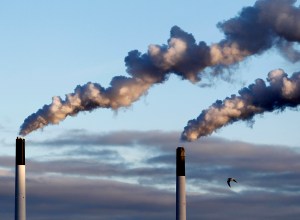
Smoke Chimneys
The first generation of any innovation—be it a new mobile phone or computer system—always comes with glitches and flaws. But still it’s tough not to feel frustrated this week by news that Europe’s carbon trading market–the first of its kind, and designed as a model for cap-and-trade schemes around the world–has been closed following a digital heist that saw an estimated $38 million of carbon credits stolen.
Europe’s Emissions Trading Scheme (ETS) was set up in 2005 to help modernize the continent’s greenhouse-gas emitting industries, and therefore reduce Europe’s carbon footprint. From the outset, companies were either allocated free carbon credits or bought them—if they exceeded their emissions quotas they were forced to buy certificates from companies that managed to reduce their carbon output through efficiency measures. On paper, the scheme has been a success: ETS now covers some 12,000 installations in a $100 billion-a-year market.
(More on Time.com: See how climate has changed Europe.)
But there was a problem—the system did not set up a central clearing house for the scheme in Brussels (one will become operational in 2013). Instead, it was up to individual countries to track ETS transactions on electronic registries. That opened the system up to fraud and theft. As Gabriele Steinhauser of The Associated Press explained in a recent article, “the fragmented nature of the market means there is nobody to track stolen or missing certificates, no catch-all number to ring up when an account has been raided.” What’s more, Steinhauser writes, carbon certificates can be traded quickly across borders, and “national registries don’t have the ability to verify the identity, and therefore the legality, of carbon credits prior to moving them into an account.”
That’s exactly what happened last week when an anonymous caller told Czech State Police that a bomb had been placed in the office of a private company that manages the Czech Republic’s national registry. After the office had been evacuated—and therefore oversight suspended— hackers stole around 475,000 allowances, worth $9.6 million (7 million euro) from a company called Blackstone Global Ventures, an environmental consultancy that trades carbon credits for industrial companies, The Wall Street Journal reported. The Journal continues “The thieves changed account-ownership information and executed illegal trades.” This isn’t the first such snafu for the ETS. Last year, according to the Journal, hackers in Britain and Denmark obtained security codes for carbon trading from traders through an online “phishing” operation and stole millions of dollars worth of certificates.
As a result of the recent Czech plot, the European Commission shut down a portion of the ETS for the first time in the six-year history of the system.. It asked all national registries to put in place minimal security requirements. That could take time: the Belgian registry, as just one example, told The Financial Times it will take “several weeks” for the checks to be put in place. The closure effects only the ETS’ spot market, which accounts for only 10-20% of total volume. Trading in carbon futures will carry on unaffected.
The big question from the ETS snafu is whether it provides a warning about the principle of a cap-and-trade scheme or simply about how to implement one. Does this offer a verdict on whether a market should be used to fix an environmental problem? I don’t think so. The theft issue is one that will go away as cap-and-trade markets mature. As Thomas Rassmuson, a partner at London-based investment firm CF Partners pointed out to AP, “It’s like the early days of banking. It was more easy to rob a bank in the old days.” That’s not to say that Europe shouldn’t get its act together, however, and make sure its carbon market remains a secure model for those countries considering possible schemes—the U.S,, South Korea, Japan, Australia and elsewhere.


